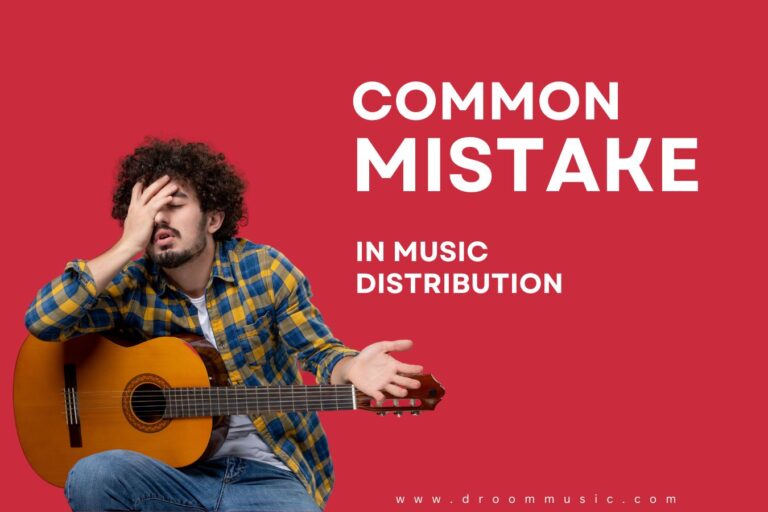

As an aspiring musician or independent artist, distributing your music is an important step in raising your profile and reaching your audience. However, there are common mistakes artists often make during the music distribution process.
Here are some of music distribution mistakes and tips on how to avoid them:
Choosing the right distribution platform:
It is important to ensure your music reaches the right audience. Errors such as, for example, not doing enough research on various distribution platforms, considering their features, pricing, reach, or simply choosing the first option presented may result in music not being visible To avoid this, thoroughly research different delivery platforms and compare their features, prices and reach to choose the one that suits your goals and target audience. please.
Improper metadata and incomplete information:
Metadata is information that accompanies music distributed online, such as track title, artist name, album name, genre, and artwork. Errors such as incomplete or inaccurate metadata, misspelled track or artist names, and missing album art can mean your music isn’t detected or looks unprofessional. To avoid this, make sure all your metadata is correct, complete, and consistent across platforms.
Ignoring Proper Release Planning and Promotions:
Simply distributing your music without proper release planning and promotion can drown you in a sea of online content. Mistakes such as not creating a release schedule, not taking advantage of pre-release promotions, and not promoting your music across different channels can lead to lower awareness and engagement. To avoid this, plan your release schedule in advance and create a promotional strategy that includes social media, mailing lists, public relations, and other relevant channels to ensure that anticipation for your release is built.
Ignore copyright and license:
Failure to understand the importance of copyright and licenses can lead to legal issues and complications down the road. Mistakes such as using copyrighted material without proper permission, failing to meet licensing requirements for cover songs, or not registering original music for copyright protection can result in lawsuits, penalties, or music removal. To avoid this, research your country’s copyright and licensing regulations, obtain proper permission for samples or covers, and register your original music for copyright protection.
Lack of proper advertising and marketing strategies:
Simply relying on music distribution platforms to promote your music without proper marketing and promotion strategies can limit your visibility and reach. Mistakes like not using tools or tactics can mean your music isn’t getting the attention it deserves. To avoid this, create a comprehensive marketing and promotional strategy that includes social media, mailing lists, public relations, live performances, collaborations, and other relevant channels to consistently engage and engage with your fans. please get
Ignoring Royalty Collection and Distribution:
Failure to understand how royalties work or neglecting to collect and distribute royalties can result in lost music revenue. Mistakes such as not registering music with a performing rights organization (PRO), properly tracking and collecting royalties from different sources, or creating a proper system for distributing royalties to collaborators can result in financial loss. You can avoid this by learning how royalties work, recording your music in PRO, properly tracking and collecting royalties from all sources, and creating a system for distributing royalties to partners in an open and timely manner.
In conclusion, avoiding these common mistakes in music distribution requires careful planning, attention to detail and a proactive approach to marketing and promotion. By doing thorough research, planning your release, ensuring accurate metadata, understanding copyright and licensing, implementing effective marketing strategies and managing royalties properly, you can increase your chances of success in the highly competitive music industry.
Ease of use:
Evaluate the platform’s user interface, ease of downloading and managing music, and technical requirements or limitations to ensure it is appropriate for your level of technical knowledge and comfort.
Pricing:
Review the features offered by the platform, such as distribution to major streaming platforms, customization options, analytics and advertising tools, and the pricing structure, including all upfront fees, subscription fees, and commissions.
Reach:
Consider the extent of the platform’s reach, including streaming services, online stores and the territories they cover, to ensure your music is available to your target audience and the markets you want to reach.
Advertising and Marketing Tools:
Look for other advertising and marketing tools offered by the Platform, such as social media integration, email lists, advertising campaigns and fan engagement features to help you promote and grow your music.
Royalty Collection and Distribution:
Understand the Platform’s royalty collection and distribution policies and processes, including payment method and timing and potential fees or commissions.
Reputation and Support:
Research the platform’s reputation, customer reviews and testimonials from other artists, as well as the level of customer support they offer to make sure they are reliable and meet your needs.
Contract Terms:
Carefully review the platform’s terms of use, the length of the contract, and any exclusivity requirements to make sure they align with your long-term goals and music plans.
It is important to thoroughly research and compare multiple music distribution platforms before making a decision. Consider your specific needs, budget and goals as an artist and choose the platform that best meets your needs.
DroomMusic offers several features that make it the best choice for independent musicians who want to distribute their music worldwide.
ADDRESS:
B 302, ANNAPURNA BUILDING,
OSHIWARA, ANDHERI WEST,
MUMBAI, INDIA - 4000102
WhatsApp us